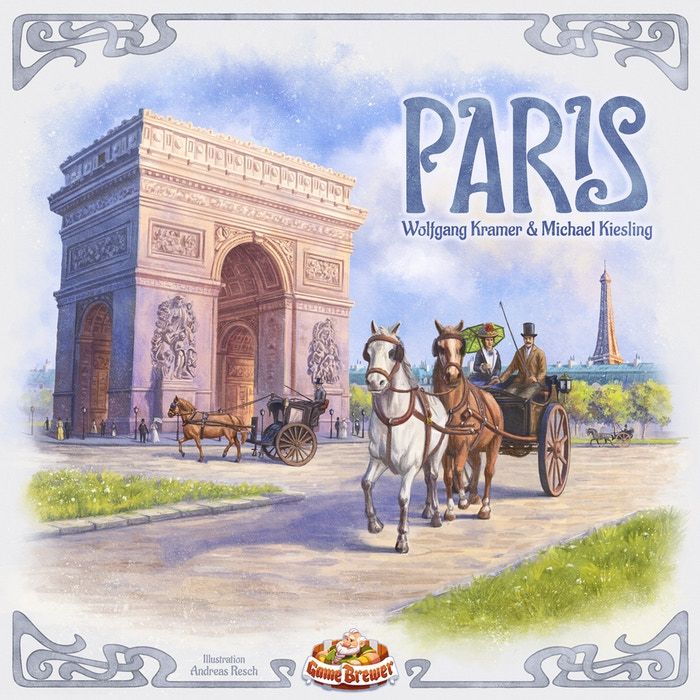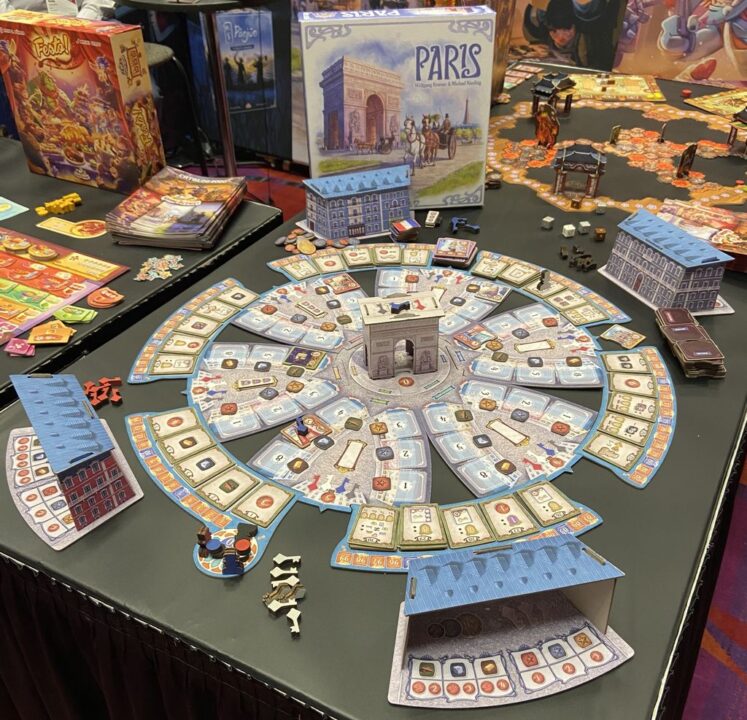Buckle up, folks! We’re cracking open the box on ‘Paris‘ today. This review will whisk you through its immersive theme, stunning artwork, and nail-biting gameplay. Join me and my friends as we explore what makes Paris a must-play—or not. Ready? Let’s go!
How It Plays
Setting Up
First, lay out the game board and place the landmark tokens on their spots. Shuffle the opportunity cards and deal a few to each player. Give each player their own set of action tokens and key markers. Everyone gets a bit of money to start, just like in real life, right?
Gameplay
Players take turns selecting actions. You can place key markers in areas of Paris, collecting resources like land and buildings. Use these resources to construct landmarks and advance your influence in the city. But be careful! Other players can compete for the same areas. Balancing your moves and keeping an eye on opponents is key (no pun intended).
Winning the Game
The game ends after a set number of rounds. Score points based on your buildings, landmarks, and special achievements from opportunity cards. The player with the most points takes the crown as the top Parisian architect!
Want to know more? Read our extensive strategy guide for Paris.
Theme and Artwork: The Soul of Paris
Let’s step into the City of Lights with Paris, a board game that transports you to the streets of 19th-century Paris. You can almost smell the fresh baguettes! The theme is rich and immersive, making you feel like you’ve rented a chic apartment in Montmartre. The game does a great job of making you feel like a Parisian. The buildings, landmarks, and streets create an atmosphere that’s as romantic as a Seine River cruise.
The artwork? Oh là là! It’s stunning. You can tell the artists poured their hearts and souls into every little detail. The illustrations are so detailed, you’ll want to hang them on your wall. No joke, I considered framing the game board! The colors are vibrant, yet not too bright. They capture the elegance and charm of Paris perfectly. When you see the Eiffel Tower, Notre-Dame, and other iconic sights on the board, you can’t help but wish you were on a real Parisian adventure.
I also love the game’s use of vintage art styles. The use of pastels and intricate designs add a touch of nostalgia and sophistication. It looks like a masterpiece in a museum. And the components are just as lovely. From the little tokens to the event cards, everything feels high quality. It’s clear the creators have a deep appreciation for Paris, and it shows in every aspect.
Now, let’s move on to the bread and butter of any board game review—the Gameplay Mechanics. Stay tuned!

Gameplay Mechanics in Paris: A Mix of Strategy and Intrigue
When I first cracked open the box of Paris, I felt like I was about to unravel a mystery wrapped in a baguette. The game intricately blends both strategy and tactical play, making every session unique. You play as a 19th-century real estate mogul in Paris, aiming to develop the city’s prominent buildings and monuments for prestige and glory. Sounds fancy, right?
The mechanics are engaging yet straightforward. Each player gets a set of key resources and action tokens. You use these to buy buildings, gather income, and advance on the prestige track. The game’s brilliance lies in its action selection system. You have to juggle your immediate needs with long-term goals, all while keeping an eye on what your opponents are scheming. It’s a brain workout without the sweat… unless you count the tension.
One of the standout features is the way buildings must be activated to score points. You see, just purchasing them won’t cut it. You need to place specific action tiles on them to unleash their full potential. This adds a juicy layer of strategy, almost like playing chess while someone keeps moving the pieces. And did I mention the opportunity cards? These bad boys can shift the game dynamic, offering special actions or bonuses. Just when you think you’ve got the upper hand, an opponent could pull one of these cards and throw a wrench in your plans.
Intrigued yet? Hold on to your tokens, because up next, we delve into the nitty-gritty of Player Interaction!

Player Interaction in Paris: Building Bonds and Rivalries
Ah, the sweet (or not so sweet) feeling of playing against your friends in Paris. Player interaction in this game is where it either makes friends or frenemies. Most of your interactions revolve around strategic placement and tactical one-upmanship. You’ll be jousting for the best spots in the city, and that’s where the fun (read: healthy competition) really heats up.
One memorable night, my friend Alex thought he had me cornered, securing all the prime building locations. Little did he know, I had a sneaky plan. I stole the most valuable landmark right from under his nose! The look on his face was priceless!
The game encourages you to think ahead, predicting others’ moves. You can’t just focus on your strategy; you need to react to what everyone else is doing. The balance of bluffing and strategizing keeps the game fresh and lively. Timing and wit are your best friends here.
The Opportunity Cards add an extra layer of interaction. You never know when a card will suddenly shake things up. Just as you feel safe, someone could flip the game on its head. It’s like watching a soap opera unfold, but with more architecture and fewer dramatic pauses.
Next time, I’ll break down the game’s Replay Value. Trust me, you don’t want to miss out on this part!
Replay Value of ‘Paris’
Let’s talk about replay value. ‘Paris’ is a game that offers a lot of variety each time you play. You know that feeling when you open the game box and think, ‘Here we go again, new adventures await’? Well, Paris delivers that in spades.
One reason for this is the game’s modular board. It’s like a game of Tetris, but way more sophisticated. Each game, you set up different tiles, which means no two games are ever the same. Variety is the spice of life, right?
Another thing that keeps you coming back is the different strategies you can employ. Do you go all-in on an economic strategy, or do you focus on cultural landmarks? Each decision makes you think and rethink your approach, ensuring that the game stays fresh. Also, opportunity cards add a whole new layer of strategy. Each card can be a game-changer, offering fresh tactics and keeping everyone on their toes.
Then there’s the escalating tension. As the game progresses, you feel the pressure mounting. It’s like being in a ticking clock scenario. This makes every decision feel critical, adding to the game’s replay value. Plus, there’s always that one friend who changes tactics mid-game just to mess with you, and you have to adapt. Fun, right?
So, do I recommend Paris? Absolutely. For those who love strategy and games that offer new experiences each time, Paris is your ticket to countless enjoyable evenings.
Conclusion
After many nights of strategizing and cursing our luck, ‘Paris’ has claimed a special spot on our gaming shelf. The board game nails its theme with immersive artwork and vintage charm. The gameplay mechanics are solid, focusing on strategy while keeping luck at bay. If you’re looking for a game that balances competition and replay value, ‘Paris’ is a must-try. This concludes my review. Grab your friends, get a croissant, and let the city of love test your gaming skills!

